Composer John Luther Adams
A Conversation with Bruce Duffie
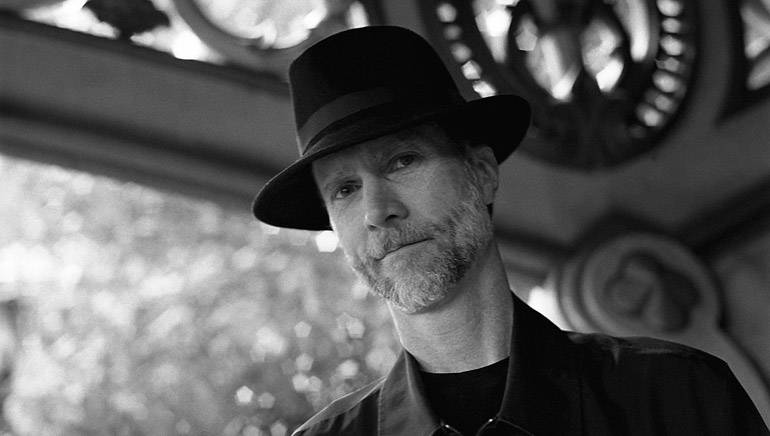
John Luther Adams (born January 23, 1953)
is an American composer whose music is inspired by nature, especially the
landscapes of Alaska, where he lived from 1978 to 2014. His orchestral
work Become Ocean was awarded the 2014 Pulitzer Prize for
Music.
Born in Meridian, Mississippi,
Adams began playing music as a teenager as a drummer in rock bands. He attended
the California Institute of the Arts as an undergraduate in the early 1970s,
studying with James Tenney and Leonard Stein, and graduated in 1973. After
graduating, Adams began work in environmental protection, and through
this work Adams first traveled to Alaska in 1975.
Adams moved to Alaska in 1978 and lived there until 2014. From 1982
to 1989, he performed as timpanist and principal percussionist with the
Fairbanks Symphony Orchestra and the Arctic Chamber Orchestra. He now splits
his time between New York and the Sonoran Desert in Mexico, though his
time in Alaska continues to be a prominent influence in his music.
|
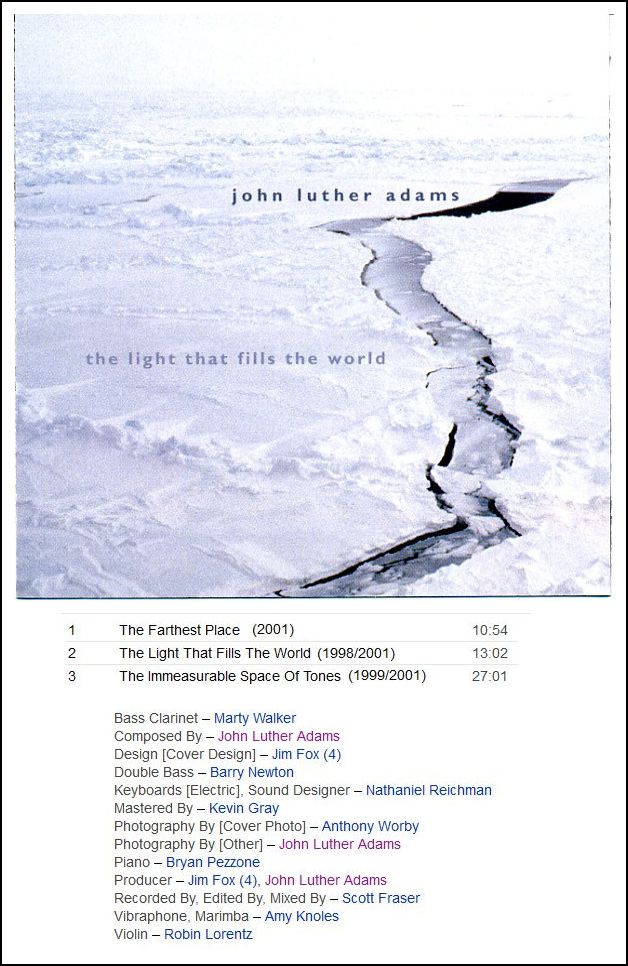
Just as
we have two presidents, John Adams and John Quincy Adams, we have two very
prominent composers — John Adams and John
Luther Adams. Both are winners of the Pulitzer Prize, and both have
gained wide-ranging fame for their music. My guest in this interview
is the one with three names, and, as he mentions near the end of our conversation,
he would have rather just been known as ‘John’.
Fate and circumstance have denied him that luxury. However, we
are fortunate to have his music in performance and on recordings.
As always, links on this page refer to my interviews elsewhere on this website,
and the one above takes you to ‘the
other guy’.
This conversation took place just as Adams was emerging as a major figure.
At the beginning of 1989, he was gaining knowledge and experience,
and yet had formulated many of his most mature thoughts about both music
and its place in society. When we met, he gladly told me about what
he was doing and how he was thinking, and his resolutions then have expanded
into the solid figure we know today, thirty years later.
Back then, his life included travel to arrange for performances of his
music, and on a visit to Chicago he stopped for a chat, which is presented
here . . . . . . . . .
Bruce Duffie: Are you able to travel as much
as you would like to get to performances of your works?
John Luther Adams: Yes and no. In some
ways I’m traveling more than I like. I travel a great deal, and
I wish there were more performances of my works so that I could have
that reason to travel more. I’ve been in Alaska, now, for almost
a dozen years, and one of the reasons that I’m able to stay is that
I am traveling more these days. I’m able to get out and work
with other musicians besides those in Alaska, and meet them and hear
works by other composers, and generally get the kind of musical stimulation
that I don’t get there. That’s very satisfying to me, although
sometimes it’s pretty exhausting to travel as much as I do. But
it does allow me to stay there, and I’m happy with that. I stay
in Alaska because it’s my spiritual home.
BD: You’ve composed in various places.
Is Alaska a special place for you to create your music?
JLA: Oh, absolutely.
BD: Why? Tell me about it.
JLA: You’ve been to Alaska yourself, so you
already know that it’s one of the most special places on the face of
the Earth. It’s special to me for a number of reasons. Like
many people of my generation
— middle-class Americans in a post-war era
— I grew up in many different places around the
country, and in a certain sense, all the different places in which I grew
up were more or less interchangeable. There was a certain suburban
homogenous quality to them, and in a very deep sense I don’t think I had
a home until I found Alaska.
BD: Being uprooted, didn’t the sameness lend
a certain amount of stability?
JLA: I suppose, but a rather bland stability,
somewhat devoid of a spiritual foundation. Maybe for the very
reason that I grew up in so many different places in peripatetic way,
a sense of place is very, very important to me, both as an individual
human being and as a creative artist. My relationship with place,
and particularly with the place in which I’ve chosen to live, is a very
deep source for me.
BD: This is reflected in the mental process
as the music is going through you onto the paper. Is it also reflected
in the sounds we hear that are going to the listener’s ear?
JLA: Certainly some would be. It is
reflected in the sound of the music. Not always! There are
some of my pieces, for instance, A Northern Suite or The Far
Country of Sleep, or a more recent orchestral work in which the actual
sound of the music can someway echo the sounds of the environment in which
I live. There are other pieces that are much more abstract in the
usual sense of the word, and in which the sounds of the music are not
necessarily influenced audibly by the sounds of the place in which I live.
But still, there’s a certain attitude that comes across in the music.
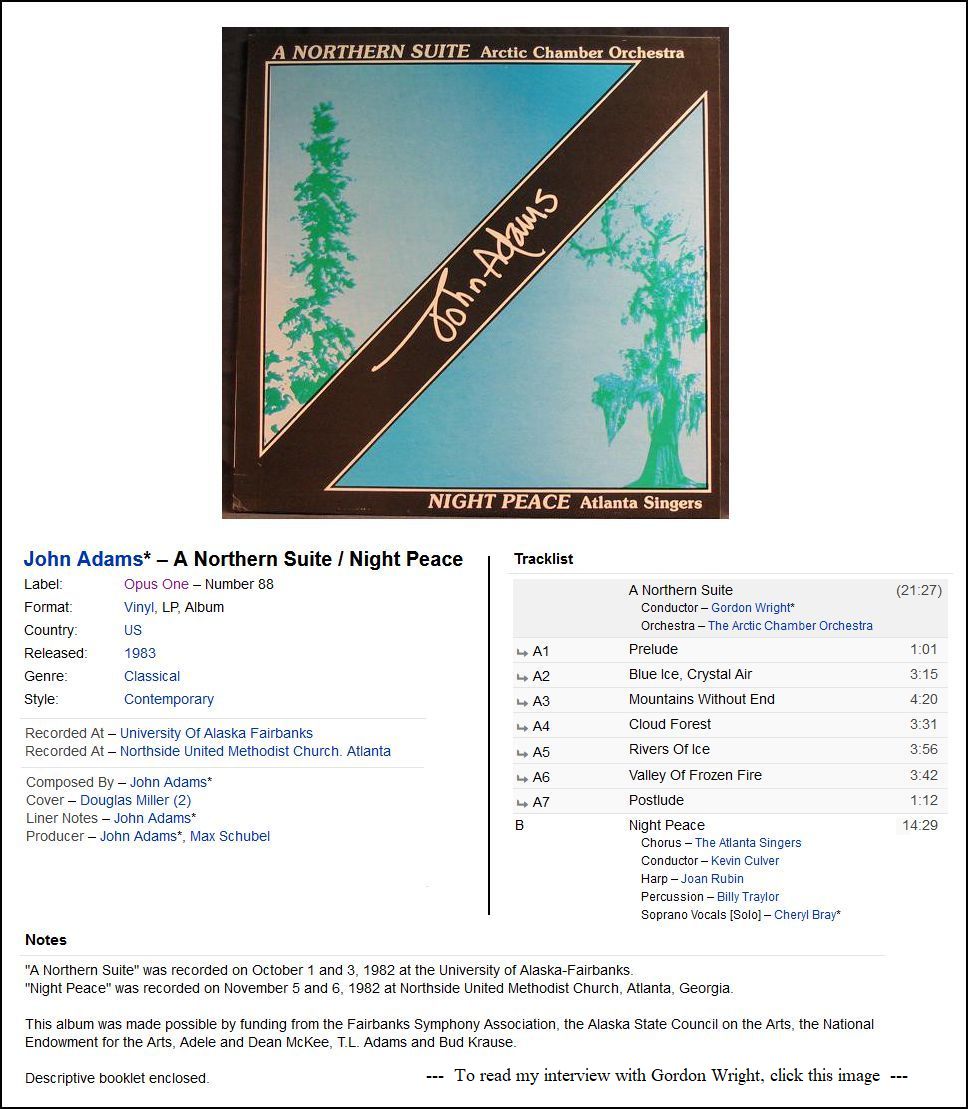
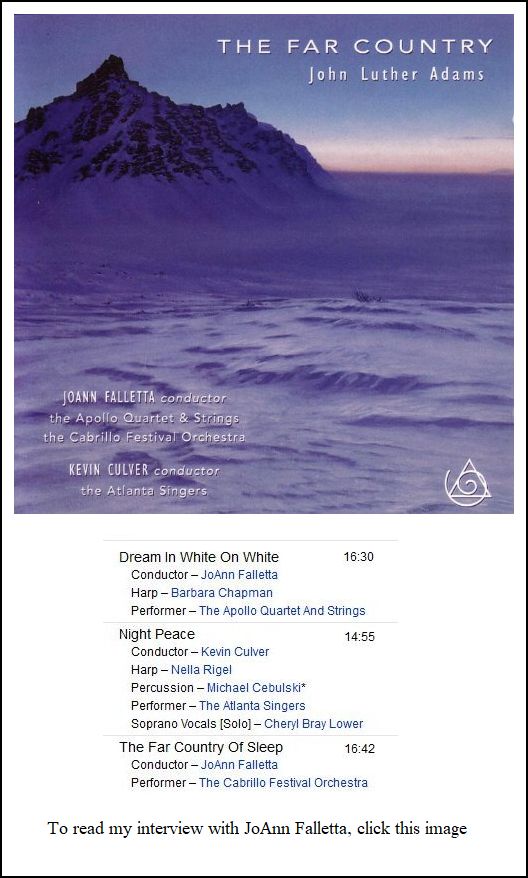 BD: Can they tell when your music
is particularly Alaskan?
BD: Can they tell when your music
is particularly Alaskan?
JLA: I don’t know. I like to think
in the best sense of that word ‘Alaskan’ that, yes, people can tell.
BD:
Is it Alaskan, or is it just northern? Could it be Finland, or
Iceland, or northern Siberia?
JLA: I suppose it could. I’ve been to
northern Scandinavia, and there’s a great similarity. I’ve not
been to Siberia, although this year I may get to go. There is
a certain similarity all the way around the circumpolar region, and not
only environmentally. There’s a great deal of cultural similarity
in the indigenous peoples of the north all the way around the globe.
BD: So it could be kind of a polar music?
JLA: Oh, sure. That’s possible. It’s
an intriguing prospect. It has a lot to do with the purity, the
austerity, the starkness, the emptiness, and the vastness of the open spaces
in the north, as well as that pristine quality, that sublime quality.
That is very, very important to me, and I don’t think it’s necessarily unique
to the north. That’s where I experience it most directly and most
deeply, but some of those very same qualities can be experienced in other
landscapes — the desert landscapes,
or, to use John Cage’s
term from the wonderful title of a wonderful piece of his from fifty or
so years ago, in Imaginary Landscapes, or the landscapes of the mind...
Varèse’s Déserts, for instance. [According
to Varèse, the title of the piece regards “not
only physical deserts of sand, sea, mountains, and snow, outer space,
deserted city streets… but also distant inner space… where man is alone
in a world of mystery and essential solitude.”]
BD: Now you’re thinking of various composers,
and you’re mentioning some. Do you feel you are part of a lineage
of composers, both American and international?
JLA: [Sighs] That’s a very complex question
for me to answer right now. [Remember, this interview was done
in 1989, when Adams was just emerging as an important force in music.]
I’ve been doing a lot of thinking in the last couple of years about
my relationship to Western culture. We live in a very odd time in
history. We’re living in the midst of a culture in serious decline,
perhaps even at the stage of decadence. The culture to which I’m
referring is the North American variation of Western European culture.
So what does it mean to be a composer, especially one so far removed from
the cultural capitals of that technological society as we approach the
Millennium? Those are questions that I’m dealing with constantly
in my own work, and in my thinking about my work. There are certainly
composers of the European classical tradition who have had very profound
influences on me. The most profound influences have been composers
who have been working in that tradition in this country in this century,
Twentieth Century American composers such as Varèse, for instance,
or John Cage, or Morton Feldman, who is a very, very profound influence
on me, and on many other younger composers. Also, there is Lou Harrison, who
as one of my very favorite people, as well as one of my very favorite
composers. Lou is a great master in the same sense that an Aaron
Copland is a great master of American music, and I think people are beginning
to understand that now.
BD: Are you becoming a great master of American
music?
JLA: [Laughs] Oh, it’s too early to tell
that. I’m just enjoying myself. I just had my thirty-sixth
birthday in Mexico last week, and I feel as though I’m just now on the
verge of beginning to compose mature works, and that’s a very, very exciting
prospect.
BD: Does that mean you’re setting aside The
Northern Suite and all the other early works?
JLA: Oh no, no! I’m not renouncing anything.
The Northern Suite is a problematical piece. The earliest
sketches for that piece date from 1975, and I’m still not finished with
it. There are other pieces of mine that come the first time, and
they never change. The Northern Suite is a particularly
difficult one for me, and in certain ways the recording that you have of
it on the Opus One record no longer satisfies me.
BD: Then what you do way when someone comes
up to you and says the recording is wonderful?
JLA: I love it, and I say, “Thank
you. I’m glad it reached you,” because
that, after all, was the most important thing.
BD: Should you still be tinkering with that
piece, or should you put it aside and do something new?
JLA: That one I’m only tinkering with because
it won’t die. People perform it, and it seems that every time someone
decides to perform it, I want to do something else with it. All
I’ve got to do now is to get one final movement right. The fifth movement,
Rivers of Ice, has been the most worrisome for me, and I’m on the
verge of getting that right. It’s a very difficult piece because it’s
so simple, because it so austere, and because it has so many of the qualities
that we were talking about just a moment ago that are inherent in the Northern
landscape. It’s very difficult to write music that is that spare,
that is so stripped down, because every single sound that every player in
the orchestra makes, counts, and every single note that I write on the page,
counts. Of course, every single note that every composer writes on
the page, counts, but in the context of a piece like that, it’s even more
difficult. It’s difficult to get something like that right.
BD: Would it actually be easier to write
a big bombastic Bruckner symphony?
JLA: I don’t know whether it would be or not.
I’ve written some noisy, notesy pieces in my time, and in a certain way,
yes, they are easier. But those are not the kinds of pieces generally
that interest me. It’s not what I’m about.
* * *
* *
JLA: You were asking about influences, or
feeling part of a certain lineage. I mentioned a few composers
who’ve been very, very important to me, and I could add a few others
to that list, certainly Harry Partch, and my principal teacher, James Tenney,
who is known as the best-known obscure composer in the North America [laughs].
He was a very strong influence on me, and also a number of other younger
composers.
BD: Now, wherever you are, you’re writing
music. You’ve always got the music in your head, and it’s filtering
down. So, even if you write a few lines in Mexico, it’s still Alaskan
music?
JLA: Yes, and no. Speaking of influences,
maybe the greatest influence in my musical life has been not so much
the music of other composers, but the music of the natural world, and indigenous
music, particularly music of the Americas. For the last several
years — for fifteen years or more,
actually — without being aware of
it I’ve been working towards some sort of an idea of a new indigenous music.
That sounds a little presumptuous, and a little bit self-conscious,
but what I mean by that is music that really grows out of a particular
place, out of the cultural and the natural environment of a particular
place. It is music that evolves slowly, through long and intimate
association with a certain place, and the cultural and natural life of
that place. That began for me with the songbirdsongs back
in the early ’70s. The first of those dates
from 1974, and it has been a concern that has occupied me in various ways
ever since. So yes, in a certain sense, no matter where I’m sketching,
my music is Alaskan. But in another real sense, if I’m working, say,
with the bird song in Chiapas, Mexico, then I hope that the music I make
from that bird song really does belong to that place, does belong to Chiapas,
and really does spring directly out of the sources of that place, and my
creative response to those sources and to that place.
BD: If you want a piece to be really Alaskan,
do you hold off and wait until you get home?
JLA: Sometimes I do, but Alaska is so much
a part of me, and is my home in such a deep way, that I carry it with
me wherever I am. So it’s not always necessary for me to wait.
The Alaskan-ness is an inescapable part of who I am and what I do now.
This coming summer I’m very much looking forward to spending the entire
summer, brief though it may be, out in the mountains, and on the rivers,
and the glaciers, and back out in the bush in Alaska. I’m beginning
a new set of pieces with the working title Earth and the Great Weather.
It will be a series of instrumental pieces, with occasionally
perhaps some texts and some vocalizing, composed in direct response
to the soundscape, as Canadian composer Murray Schafer calls it.
That is, the sounds of the natural environment. So, I will be out
there listening in a very deep way, and writing in response to that.
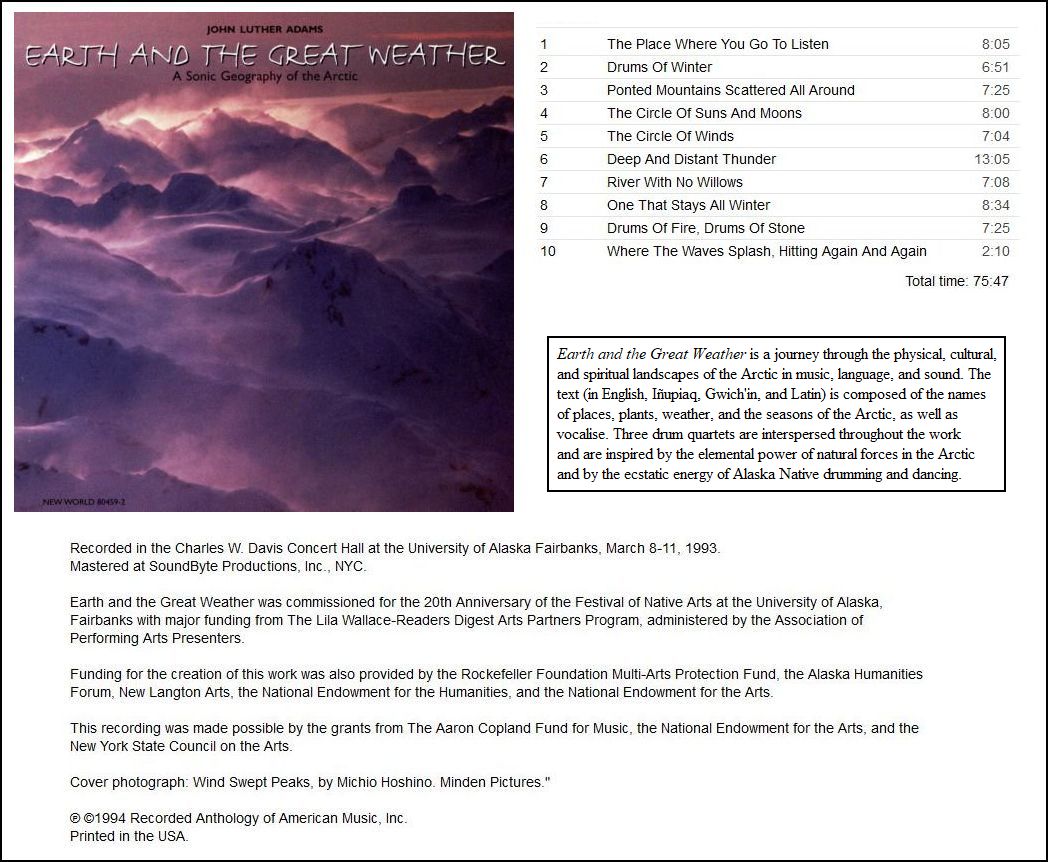
BD: You, more than others, seem to be affected
by the environment in your sounds and what goes onto the paper.
When you’re holding the pencil, are you in control of it, or is that
pencil really controlling you?
JLA: Sometimes the pencil controls me, and
sometimes I control the pencil. With each piece it’s
a little bit different, but generally speaking, I’m beginning to think
that when I’m controlling the pencil, what comes out is generally not
the good stuff, and when the good stuff comes out, it’s when the pencil
is controlling me. The music that writes itself generally tends
to be the real music. If I’m working too hard on something, and
if it’s too much like pulling teeth or performing brain surgery, then generally
it’s lacking in that essence.
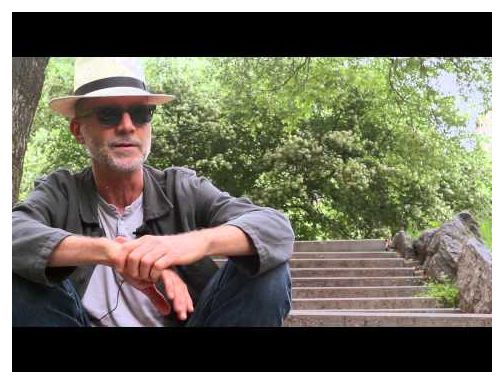 BD: Is writing music as important as brain surgery?
BD: Is writing music as important as brain surgery?
JLA: Oh, every bit as important as brain
surgery. Writing music is absolutely vital.
BD: Let me ask the big philosophical question
then. What is the purpose of music in society?
JLA: That is the biggest question, isn’t it?
We were talking earlier about my feelings as to where we are in history,
and in the evolution or the decline of what’s been culture. My preoccupation
of these questions is to ask what I am doing at this stage in history,
devoting my life to this archaic art or craft of writing music. Incidentally,
I believe there are more developments, said I used to say that the questions
were far more important than the answers. I love the questions, but
part of my tentative answer to that very, very large question of what am
I doing, is that I’m trying to search for the roots, or the beginnings
— the seeds, if you will
— of a new culture, which again sounds very grandiose and
very presumptuous, and I don’t mean it that way. It’s really a very
humble and very small thing that I do, and there are many, many, many other
people out there who are working in the same way, trying to search for
some way to vitalize, or recreate our culture.
BD: Is it a new culture, or is it a new spring
in the old culture?
JLA: I don’t know. Only history will tell
us that. But what we’re trying to do —
as best we know how, and to the extent that we’re aware of
it — is to reconnect with the most ancient,
deepest sources. I believe that the natural world, and our relationship
with the natural world — as inescapably
we are part of the natural world — is
in a very real way at the absolute foundation. It’s the bedrock of
civilization. My friend, Barry Lopez, made a remark in a conversation
that stuck with me for years. He said that, “Landscape
is the culture that contains all human cultures.”
That’s a very profound statement, and it encapsulates very eloquently
for me what it is that I’m doing in my work as a composer, in my very
small way. [Barry Holstun Lopez (born January 6, 1945) is
an American author, essayist, and fiction writer whose work is known for its
humanitarian and environmental concerns. He won the National Book Award for
Nonfiction for Arctic Dreams (1986) and his Of Wolves and Men
(1978) was a National Book Award finalist.]
* * *
* *
BD: You brought up the idea that there are
many others working in the same kind of field. Are there perhaps
too many composers writing music today?
JLA: Yes, but not me! [Both laugh]
I’ve heard a lot of music over the last several years, going around to
different cities and taking part in different performances, festivals,
and so on. I’ve also been on a few panels, reviewing scores and
tapes for programs, or for prizes. I’ve seen and heard a lot of
music, and I’ve been absolutely astounded at the shear fecundity and technical
brilliance of composers working out there today. There are so many
composers out there who have so much more technique, in a strict musical
sense, than I will ever have, and I stand in awe of that. And yet,
a lot of that music is strangely devoid of real spiritual content.
I don’t want to say that there are too many composers writing out there,
and these half a dozen, or dozen, should stop writing, [both laugh] but
maybe we do have a little bit of art pollution. You also asked about
the purpose of music, and I’ve recently come back to a little saying from
India, by way of John Cage, that has meant a lot to me, and applies very
directly to the work that I do. It is very, very profound, and addresses
very directly the question. Cage asked an Indian musician about the
purpose of music, and the answer that he received was, “To
quiet the mind, thus rendering it susceptible to divine influences.”
I like that very much. There’s another thing that Cage relates,
which is not an original thought with him, at least his own words, and
that is, “To imitate nature in her manner of operation.”
That doesn’t necessarily mean to write program music, and it doesn’t mean
that everyone should be out writing songbirdsongs. But there
is a vast territory described by that simple statement. After all,
we are part of nature too, and the human mind, and the human imagination
is as much a part of nature as the physical eco-system of Baffin Island.
But that is a very elegant, and a very enormous statement about the
purpose of music that I like very much. I’m not sure I understand it,
but I love it.
BD: You’re working on the understanding?
JLA: Yes.
BD: Where’s the balance between the artistic
achievement and a potential entertainment value?
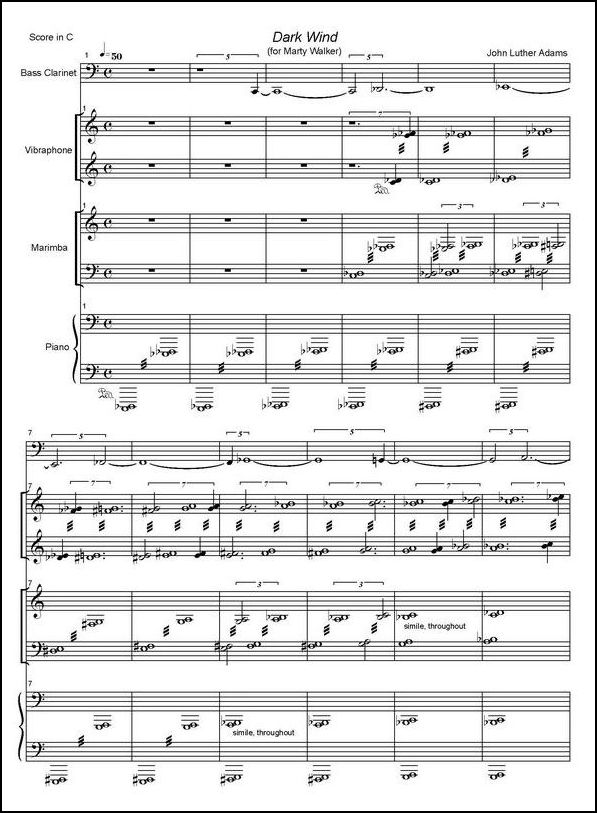 JLA: That’s another very, very difficult
question. I’m not sure I understand what the word ‘entertainment’
means, and maybe no one really does. We have a mass-market understanding
of entertainment... Michael Jackson is entertainment.
JLA: That’s another very, very difficult
question. I’m not sure I understand what the word ‘entertainment’
means, and maybe no one really does. We have a mass-market understanding
of entertainment... Michael Jackson is entertainment.
BD: The Chicago Bears are entertainment?
JLA: The Chicago Bears are great entertainment.
BD: Is an Alaskan sunrise entertainment?
JLA: It certainly entertains me.
BD: Let me change it a little. Is watching
whales playing in the bay entertainment?
JLA: Oh, that’s great fun! Maybe you
just hit on the key to the concept, the notion of entertainment.
Maybe it’s not so much sitting back and watching something, as it is participating
in something, or playing with something. That word ‘play’ is very,
very important, and certainly, in any creative act
— whether it is the act of writing a piece of music, or
the act of watching whales play, or the act of creatively listening to
a piece of music — any act like that
which engages a person in a direct authentic experience in which they
are participating, is of the essence of both creativity in the deepest
sense, and entertainment. It’s fun. It’s play. You’re
playing with the universe. You’re paying with creation, and that’s
entertaining.
BD: What do you expect of the audience that
comes to hear a piece of your music?
JLA: That’s another big, big question. I
think of the audience constantly, and I try to forget them constantly,
and most composers would probably give you some personal version of that
kind of answer. I care very, very much about the individual listener,
and I want very, very much to touch you as an individual. I don’t
subscribe to the notion that I am a composer, and I have these things
that I must do, or that I must say, or that I must compose and let the
chips fall where they may. The world can come to me, or the world
can go to hell... I don’t have that kind of attitude. I care very,
very deeply about the individual listener, and I keep the individual listener
in mind. I don’t think so much in terms of the larger mass audience,
but rather that one-to-one communication, that direct experience of sharing
with another person. Schafer says that sound is a way of touching
at a distance, and I like that very much. It’s a very beautiful capsulation
of what it is to share music with someone. I love it when I learn
something from a listener, from someone who tells me
— after they’ve heard a piece of mine in a concert or on
a recording — something I didn’t know
about it. That’s what completes the circle.
BD: Is your first communication with the
performer, as opposed to the listener?
JLA: No, my first communication is with the music,
and what that is, exactly, I can’t tell you. But that initial
impulse, the source of which the music originally springs, is removed
from the listener and from the performer, and, in its purest stage, even
for myself. After all that’s what Cage is talking about, and it’s
certainly what Zen Buddhism and other great disciplines are about. It’s
ultimately what the creative act is about — transcending
ourselves, and losing ourselves in that larger participation with the
act of creation and with creation as a whole. We are playing with the
universe again.
BD: Is composing fun?
JLA: Oh, it’s great fun! It’s also
hard, hard work. There’s a lot of grunt involved in composing,
especially in the old-fashioned way in which I compose
— that is, notes on paper. There’s a lot of
drudgery.
BD: There’s a lot of composers now doing
it on computer.
JLA: Yes, but I haven’t done it yet. It’s
not so much of any philosophical objection, but I haven’t yet found the
right system. I’m not really interested in synthesizer sounds.
They really don’t have the richness and the complexity of acoustical
sounds. They don’t satisfy my ear. But I am interested in
finding a note-processor — software and
a machine to run it that will allow me to not go through each successive
draft of a piece. God knows how many drafts The Northern Suite
has been through in long-hand!
BD: So, once the sounds are there, then it is
just the mechanics?
JLA: Just to be able to move things around,
and edit, and then spit out parts, and put my poor copyist out of business.
That part of it I’m very much interested in, and I haven’t taken the
plunge yet. But it’s just because I haven’t found the right system,
and also there’s a certain investment of time to learn how to run the
new equipment.
BD: Cecil Effinger is working
on that with IBM. When he was in Chicago, he showed me some of
the stuff that the machine is printing out. It’s just beautiful.
It’s like it’s engraved.
JLA: Yes. In just the last six months
I’ve gotten six or seven different fliers from companies that have come
out with a new generation of more sophisticated software, and it’s really
quite impressive.
* * *
* *
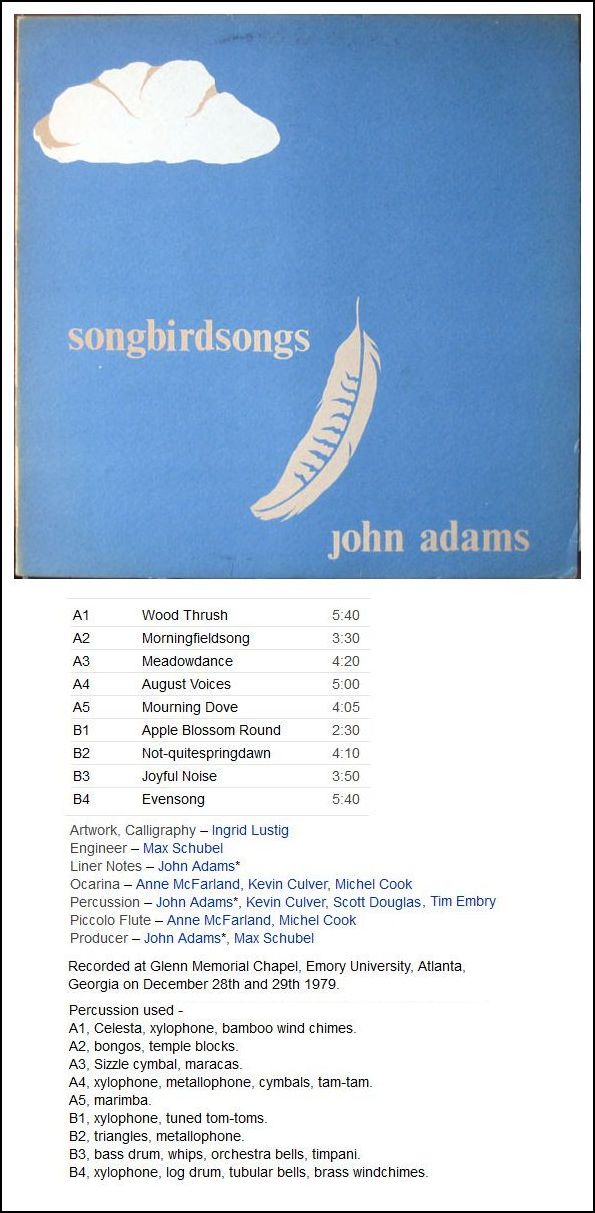 BD: Have you basically been pleased with the performances
you’ve heard of your music over the years?
BD: Have you basically been pleased with the performances
you’ve heard of your music over the years?
JLA: [Sighs] You are asking the tough questions,
aren’t you? [Laughs] I certainly don’t want to slight anyone,
but by virtue of the fact that I have chosen to live and work where I
do, I have made certain compromises or sacrifices. One of those is
that I’m not living in a large metropolitan area where there are umpteen
thousand fabulous musicians hungry to play new music. So, quite
often I’m dealing with amateur musicians of limited technical abilities.
Quite often that doesn’t matter, because many of my pieces are rather
simple technically. Some of my performances, and some of my recorded
performances have been very, very satisfying to me. There are things
that I have on tape that are ten years old, and that I still think are just
fine. Other things haven’t aged so well, and there are certain pieces
of mine that I’m still waiting to hear for the first time, or that have been
performed but haven’t satisfied me.
BD: Do you write mostly on commission?
JLA: I write mostly on commission, or for
occasions, yes. I haven’t in years written a piece in the abstract,
and just put it on the shelf, or sent it out in the mail trying to find
someone to perform it. I’ve been very fortunate in that sense. I
have an abundance of sketches and ideas for pieces, and those have always
seemed to find a match with a performing group, and an occasion, and
quite often a commission. That is the best of circumstances.
BD: Have you ever turned down a commission?
JLA: I gave one back last year simply because
I was too overloaded. I had too many things going, and I was embarrassed
to have to do that, but I felt great after I did it. It was a wonderful
feeling.
BD: Do you work on one piece at a time, or
several pieces at a time?
JLA: Generally, when I’m in the stage of writing
lots of notes on paper, I limit it to one piece at a time. The
earlier stages — sketching, or the
broader conceptual stages of pieces — I
can be working on several different things at once. For instance,
just this last month when I’ve been traveling in Mexico, I’ve been sketching
the preliminary stages on three or four or five different pieces. Some
ideas came along on the trip, and, at the same time, I was writing notes
on paper for one piece. But generally I’m not actively engaged in
intensive composing on more than piece at a time.
BD: When you start out working on a piece,
are you conscious of how long it will take to perform, even when you’re
just doing the sketches?
JLA: Yes, generally I am. In the new set of
pieces that I’m going to begin working on this summer, Earth and
the Great Weather, I’m going to make an attempt to be less pre-occupied
with that notion of temporal framing. In fact, I may be writing
this piece so that there will be a possibility of a given section being
done in several different versions with several different durations.
But generally, yes, I set out and I know that this is going to be a
six-minute piece, or this is going to be a ten- to fifteen-minute piece.
Sometimes the music runs out before I thought it would, and other times
it goes on a little bit longer than I thought it would. But just
now, as I’m beginning to work on Earth and the Great Weather, I
really am beginning to think in terms of a temporal scale, and that’s something
I’ve been concerned with for a long time. Recently, at the New Music
America Festival in Miami, I heard several of the late works of Morton Feldman,
which, as you know, are of very, very long duration. His second string
quartet goes on for five and a half hours, and he wrote a series of three
trios that run from forty minutes to four and a half hours. That
was a very profound experience for me as a listener as well as a composer,
and that experience, coupled with the experience of conducting a performance
of Cage’s Concert for Piano and Orchestra, have gotten me thinking
again about the notion of how we frame pieces of music in terms of time,
and how time flows within those frames, and really how limited, and almost
formulaic the tempo of Western music is. Generally speaking, your average
piece of contemporary music is ten to twenty minutes long, and it has a beginning,
a middle and an end. All that’s great and wonderful, but maybe there
are other ways of dealing with musical time. That’s one of the very
profound things that listening to the sounds of the natural world can do
for us, for human music. This can alter our sense of time and time
perception, because so many of the sounds in the natural world are so much
longer, or so much shorter than the universe of durations that we deal with
in concert music. Another wonderful thing about the sounds of the natural
world, in terms and their implications for my musical semantics, is that
most of our Western music is based on the notion of relationships
— this sound to that sound, an interval, a linear
development, a recurring theme. But in the natural world, although
there are certainly recurring themes, each sound generally tends to have
its own independent life, and the relationships between the sounds are certainly
more spontaneous, but they’re also more complex. These are all very
abstract ideas, but it’s just to tell you a little bit about why I am working
with the sources that I am. It’s not just my love for the mountains,
and the birds, and the wild places. It’s also that I really believe
in terms, strictly of the semantics of our musical language, that we have
a great deal to learn from imitating nature in her manner of operation.
BD: It gives us an idea in the working mind
of the musician.
JLA: I think it’s really at the root of so
many of our artistic forms and energies.
BD: [Noting the natural stopping point of the conversation]
Let me get you do a station break for us. [Hands him a card
which read, “Hello.
This is ______, and you are listening to WNIB, Classical 97, in
Chicago.”]
Just insert your name, and read that, please.
JLA: Sure. I guess I should use all
three names?
BD: I was going to ask how you prefer to
be called.
JLA: I prefer to be called John! [Laughs]
BD: [In an exceptionally highfalutin
announcer-type voice] Next, we have some music by John! [Both
laugh]
JLA: Professionally, I would like to be John Adams,
but I have gotten used to using my middle name in the last several years
just out of sheer necessity. [Reads the station break, using all
three names]
BD: Thank you. It has been a pleasure to speak
with you today, and I wish you continued success in your career. We
certainly will hear a lot more from you.
JLA: I hope so. Thank you very much.
========
========
========
---- ---- ----
======== ========
========
© 1989 Bruce Duffie
This conversation was recorded in Chicago on January 27, 1989.
Portions were broadcast on WNIB in 1993 and 1998. The unedited audio
was also placed in the Oral History of American Music Archive at
Yale University. This transcription was made in
2020, and posted on this website at that time.
My thanks to British soprano Una Barry for her
help in preparing this website presentation.
To see a full list (with links) of interviews which have been transcribed
and posted on this website, click here.
Award -
winning broadcaster Bruce Duffie
was with WNIB,
Classical 97 in Chicago from 1975
until its final moment as a classical station in
February of 2001. His interviews have also appeared
in various magazines and journals since 1980, and he
now continues his broadcast series on WNUR-FM, as
well as on Contemporary
Classical Internet Radio.
You are invited to visit his website for more information
about his work, including selected
transcripts of other interviews, plus a full
list of his guests. He would also like to call
your attention to the photos and information about
his grandfather,
who was a pioneer in the automotive field more than a century ago.
You may also send him E-Mail with comments,
questions and suggestions.



 BD: Can they tell when your music
is particularly Alaskan?
BD: Can they tell when your music
is particularly Alaskan?
 BD: Is writing music as important as brain surgery?
BD: Is writing music as important as brain surgery? JLA: That’s another very, very difficult
question. I’m not sure I understand what the word ‘entertainment’
means, and maybe no one really does. We have a mass-market understanding
of entertainment... Michael Jackson is entertainment.
JLA: That’s another very, very difficult
question. I’m not sure I understand what the word ‘entertainment’
means, and maybe no one really does. We have a mass-market understanding
of entertainment... Michael Jackson is entertainment. BD: Have you basically been pleased with the performances
you’ve heard of your music over the years?
BD: Have you basically been pleased with the performances
you’ve heard of your music over the years?